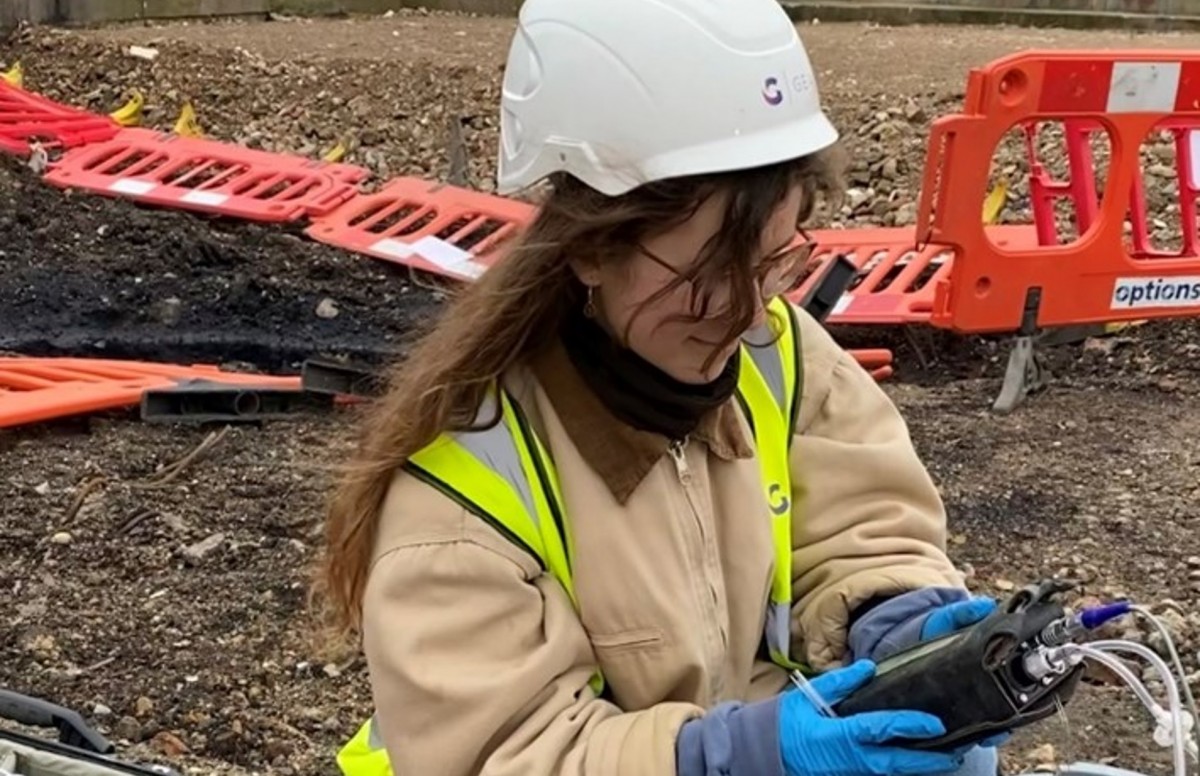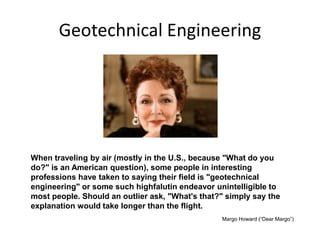The Only Guide to Geotheta
Table of ContentsFacts About Geotheta RevealedLittle Known Facts About Geotheta.The smart Trick of Geotheta That Nobody is DiscussingGeotheta Can Be Fun For AnyoneNot known Details About Geotheta

They carry out site examinations, collect examples, do research laboratory tests, and analyze data to assess the suitability of the ground for building jobs - Geotechnical Engineers. Based upon their searchings for, geotechnical designers give referrals for structure style, slope stability, keeping structures, and mitigation of geotechnical risks. They work together with other professionals, such as architects, architectural engineers, and building teams, to make certain that geotechnical factors to consider are incorporated into the total task layout and application
By examining the actions and homes of soil and rock, they can determine potential geotechnical threats such as landslides, soil settlement, or slope instability. Their competence helps prevent failings or mishaps that might endanger lives and property. Below are some in-depth responsibilities and responsibilities of a geotechnical engineer: Website Investigation: Geotechnical engineers conduct website investigations to collect data on subsurface conditions.
They interpret the information to recognize the homes and habits of the soil and rock, including their strength, leaks in the structure, compaction features, and groundwater problems. Geotechnical Evaluation and Design: Geotechnical engineers analyze the data collected throughout site investigations to assess the security and viability of the site for building projects. They execute geotechnical estimations and modeling to examine elements such as birthing capability, negotiation, slope stability, side planet pressures, and groundwater flow.
All About Geotheta
Structure Layout: Geotechnical engineers play a critical duty in developing structures that can safely support the desired framework. They assess the dirt conditions and lots needs to establish the suitable structure kind, such as superficial foundations (e.g., footings), deep structures (e.g (https://realistic-swam-lvtf1k.mystrikingly.com/blog/unlocking-the-secrets-of-geotechnical-engineers-the-geotheta-advantage)., piles), or specialized techniques like dirt renovation. They take into consideration aspects such as negotiation restrictions, bearing capability, and soil-structure communication to establish optimal structure styles
They evaluate building plans, monitor website activities, and perform field inspections to confirm that the design referrals are adhered to. If unexpected geotechnical issues develop, they analyze the circumstance and provide suggestions for remediation or modifications to the design. Threat Assessment and Mitigation: Geotechnical engineers analyze geotechnical risks and threats related to the task site, such as landslides, liquefaction, or soil disintegration.

Collaboration and Interaction: Geotechnical engineers function carefully with other experts associated check out here with a job, such as designers, architectural engineers, and building groups. Reliable interaction and collaboration are necessary to integrate geotechnical considerations into the general project style and construction procedure. Geotechnical engineers give technical knowledge, solution queries, and make certain that geotechnical demands are fulfilled.
7 Easy Facts About Geotheta Explained
Below are some sorts of geotechnical engineers: Foundation Engineer: Foundation engineers focus on making and analyzing foundations for frameworks. They examine the dirt conditions, load requirements, and site features to establish one of the most proper structure type and layout, such as superficial foundations, deep structures, or specialized techniques like stack foundations.
They evaluate the variables affecting incline security, such as soil residential or commercial properties, groundwater conditions, and incline geometry, and develop methods to stop incline failures and minimize threats. Quake Engineer: Earthquake engineers specialize in analyzing and designing structures to endure seismic forces. They assess the seismic risk of a website, evaluate dirt liquefaction capacity, and create seismic style requirements to make sure the security and resilience of frameworks during earthquakes.
They execute field testing, collect examples, and examine the collected data to define the soil residential or commercial properties, geologic formations, and groundwater problems at a site. Geotechnical Instrumentation Engineer: Geotechnical instrumentation designers concentrate on surveillance and gauging the habits of dirt, rock, and frameworks. They set up and preserve instrumentation systems that check aspects such as soil settlement, groundwater degrees, slope motions, and architectural displacements to analyze performance and give very early warnings of possible issues.
The smart Trick of Geotheta That Nobody is Talking About
They conduct tests such as triaxial tests, consolidation tests, direct shear tests, and leaks in the structure tests to collect data for geotechnical analysis and layout. Geosynthetics Designer: Geosynthetics designers focus on the layout and application of geosynthetic products, such as geotextiles, geogrids, and geomembranes. They utilize these products to enhance dirt stability, reinforce inclines, offer drain options, and control erosion.
They often tend to be investigatory people, which means they're intellectual, introspective, and investigative. They are curious, systematic, logical, analytical, and logical. Some of them are also social, indicating they're kind, generous, cooperative, individual, caring, handy, understanding, tactful, and pleasant - Geo Tech Engineering.
In the workplace atmosphere, geotechnical engineers utilize specialized software devices to carry out estimations, create styles, and examine information. They prepare records, testimonial task specifications, connect with clients and team members, and coordinate task activities. The office setting provides a favorable atmosphere for research, evaluation, and collaboration with various other professionals associated with the job.
Facts About Geotheta Uncovered
They often see job websites to carry out website examinations, evaluate geotechnical problems, and collect data for evaluation. These brows through include taking a trip to various areas, occasionally in remote or challenging surfaces. Geotechnical engineers might perform dirt sampling, conduct examinations, and display construction tasks to guarantee that the geotechnical aspects of the job are being applied correctly.
Geotechnical designers additionally function in specialized geotechnical laboratories. In these centers, they conduct experiments, carry out examinations on dirt and rock examples, and examine the design properties of the materials. Geotechnical research laboratory designers function thoroughly in these settings, dealing with testing tools, operating instruments, and taping information. They work together with other lab personnel to guarantee precise and trustworthy testing results.